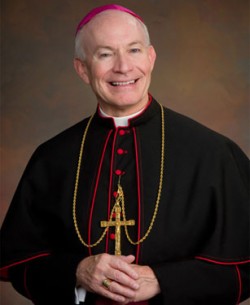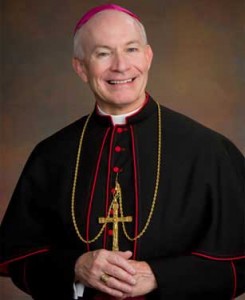Podcast: Play in new window | Download (Duration: 27:06 — 24.8MB) | Embed
Subscribe: Apple Podcasts | Spotify | Amazon Music | Android | Pandora | iHeartRadio | JioSaavn | Podchaser | Gaana | Podcast Index | Email | TuneIn | Deezer | Anghami | RSS | More
Archbishop Lucas offers insights on the US Catholic Catechism for Adults Chapter 29:
Intentional euthanasia, sometimes called mercy killing, is murder. Regardless of the motives or means, euthanasia consists of putting to death those who are sick, are disabled, or are dying. It is morally unacceptable. The emergence of physician-assisted suicide, popularized by the right-to-die movement, seeks to legalize what is an immoral act. Its advocates plan to achieve this on a state-by-state basis.
Suicide is gravely sinful whether committed alone or aided by a doctor. Serious psychological disturbances, anxiety, fear of suffering, or torture can diminish the responsibility of the one committing suicide. The question is often asked whether persons who have committed suicide receive eternal salvation. Although suicide is always objectively sinful, one “should not despair of the eternal salvation of persons who have taken their own lives. By ways known to him alone, God can provide the opportunity for salutary repentance. The Church prays for persons who have taken their own lives” (CCC, no. 2283). The pastoral care of family and friends of those who have taken their own lives is an important focus for the Church’s healing and compassionate ministry.
Catholic moral tradition has always taught that we can discontinue medical procedures that are burdensome, extraordinary, and disproportionate to the outcome. However, respect for every human being demands the ordinary treatment of the dying by the provision of food, water, warmth, and hygiene. Ordinary treatment is always a moral requirement.
There is also extraordinary treatment. The Church recognizes that some medical treatment may not provide benefits commensurate with the risks of certain medical procedures. Extraordinary medical treatment may not be morally required and can even cease in certain cases, depending on the benefits to the sick person and the burdens it will or may impose. For example, in instances when a person has been declared brain-dead, the patient can be disconnected from mechanical devices that sustain breathing and the heart since there is little hope of the person’s recovery.
United States Conference of Catholic Bishops (USCCB) (2012-04-02). United States Catholic Catechism for Adults (Kindle Locations 5696-5710). United States Conference of Catholic Bishops (USCCB). Kindle Edition.
The Most Reverend George J. Lucas leads the Archdiocese of Omaha.
For other episodes in the visit our Archbishop George Lucas page
This programs is based on:
More information can be found here.
We wish to thank the USCCB for the permissions granted for use of relevant material used in this series.
[ezcc]




